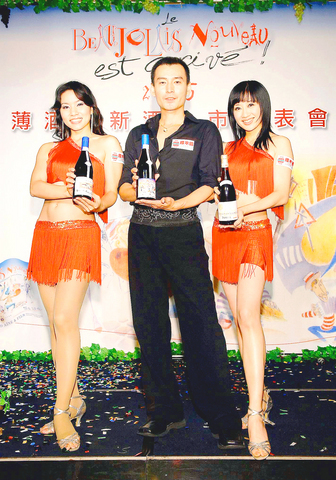The nation's love for Beaujolais Nouveau is growing quickly, making Taiwan Asia's second largest importer of the fruity French wine after Japan, retailers said.P>
Imports of Beaujolais wines are expected to top 800,000 bottles this year, up from 650,000 last year, and include affordable products available in convenience stores and supermarkets.
"It has become a fad in Taiwan, so wine lovers here have been expecting its arrival and are keen to savor the latest batch of Beaujolais," said Margery Ho (何默真), public relations official of the hypermarket chain RT-Mart (大潤發).

PHOTO: WANG MENG-LUN, TAIPEI TIMES
In keeping with the annual tradition, the wines will be uncorked in three days -- the third Thursday of November.
Although the harvest slumped by 50 percent, the quality of this year's wine, which hails from the Beaujolais wine-growing region south of Burgundy, is said to be comparable to that in 1929, 1947 and 1976, according to the Landis Taipei Hotel.
"It could be the best in the past century," the hotel said in a press release to promote its Beaujolais meal specials.
RT-Mart, which aims to grab a bigger share of the market, plans to present more high-quality Beaujolais this year, while maintaining its overall number of imports at about 150,000, the same as last year.
In addition to the three categories of wine -- Beaujolais, Beaujolais Villages and Beaujolais Crus -- RT-Mart is also offering limited-edition exquisite wines by the French firm Grand Vin Selles, Ho said.
This is aimed at tapping into another niche market, while continuing to promise the lowest prices in Taiwan for Beaujolais wines, she added.
Carrefour SA, the world's second-largest hypermarket operator, also entrusted the winery Georges Duboeuf -- dubbed the "King of Beaujolais" -- to produce the retailer's own-brand Beaujolais wines, which will be available in its outlets worldwide at much cheaper prices, said Dream Lin (林夢紹), public relations manager of Carrefour Taiwan.
Carrefour Taiwan expects to import 60,000 bottles of Beaujolais wines this year, up 30 percent from last year, including vintages from the famous wine-maker Henry Fessy.
Due to cut-throat competition, the retailers are keeping their selling prices top secret, waiting until the last minute to reveal them.
"I don't think the price will go under NT$200 [US$6] a bottle, which happened last year," Lin said, explaining that rising transportation charges this year should keep the prices at a higher level.

Sweeping policy changes under US Secretary of Health and Human Services Robert F. Kennedy Jr are having a chilling effect on vaccine makers as anti-vaccine rhetoric has turned into concrete changes in inoculation schedules and recommendations, investors and executives said. The administration of US President Donald Trump has in the past year upended vaccine recommendations, with the country last month ending its longstanding guidance that all children receive inoculations against flu, hepatitis A and other diseases. The unprecedented changes have led to diminished vaccine usage, hurt the investment case for some biotechs, and created a drag that would likely dent revenues and

Macronix International Co (旺宏), the world’s biggest NOR flash memory supplier, yesterday said it would spend NT$22 billion (US$699.1 million) on capacity expansion this year to increase its production of mid-to-low-density memory chips as the world’s major memorychip suppliers are phasing out the market. The company said its planned capital expenditures are about 11 times higher than the NT$1.8 billion it spent on new facilities and equipment last year. A majority of this year’s outlay would be allocated to step up capacity of multi-level cell (MLC) NAND flash memory chips, which are used in embedded multimedia cards (eMMC), a managed

CULPRITS: Factors that affected the slip included falling global crude oil prices, wait-and-see consumer attitudes due to US tariffs and a different Lunar New Year holiday schedule Taiwan’s retail sales ended a nine-year growth streak last year, slipping 0.2 percent from a year earlier as uncertainty over US tariff policies affected demand for durable goods, data released on Friday by the Ministry of Economic Affairs showed. Last year’s retail sales totaled NT$4.84 trillion (US$153.27 billion), down about NT$9.5 billion, or 0.2 percent, from 2024. Despite the decline, the figure was still the second-highest annual sales total on record. Ministry statistics department deputy head Chen Yu-fang (陳玉芳) said sales of cars, motorcycles and related products, which accounted for 17.4 percent of total retail rales last year, fell NT$68.1 billion, or

In the wake of strong global demand for AI applications, Taiwan’s export-oriented economy accelerated with the composite index of economic indicators flashing the first “red” light in December for one year, indicating the economy is in booming mode, the National Development Council (NDC) said yesterday. Moreover, the index of leading indicators, which gauges the potential state of the economy over the next six months, also moved higher in December amid growing optimism over the outlook, the NDC said. In December, the index of economic indicators rose one point from a month earlier to 38, at the lower end of the “red” light.